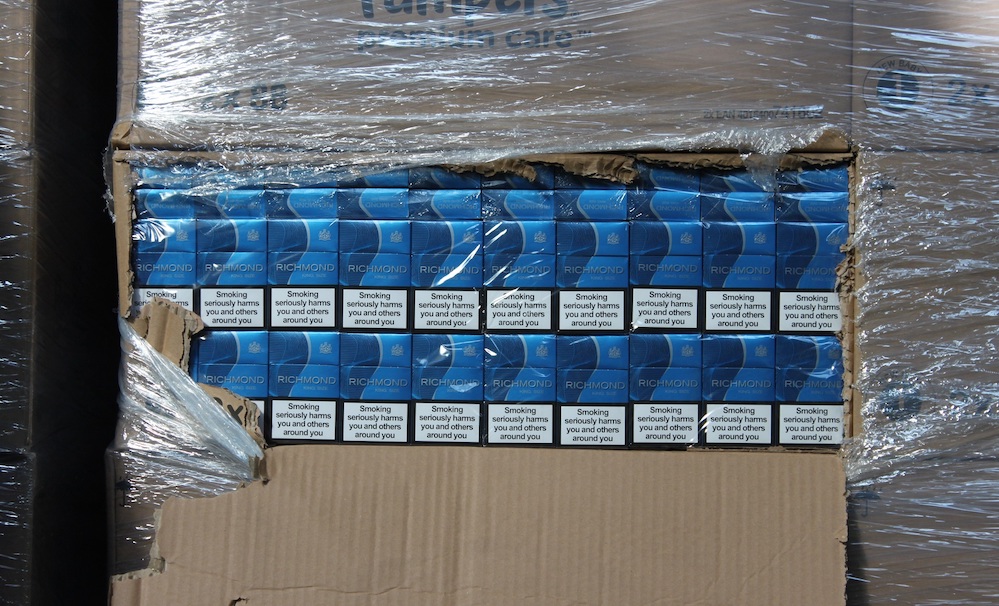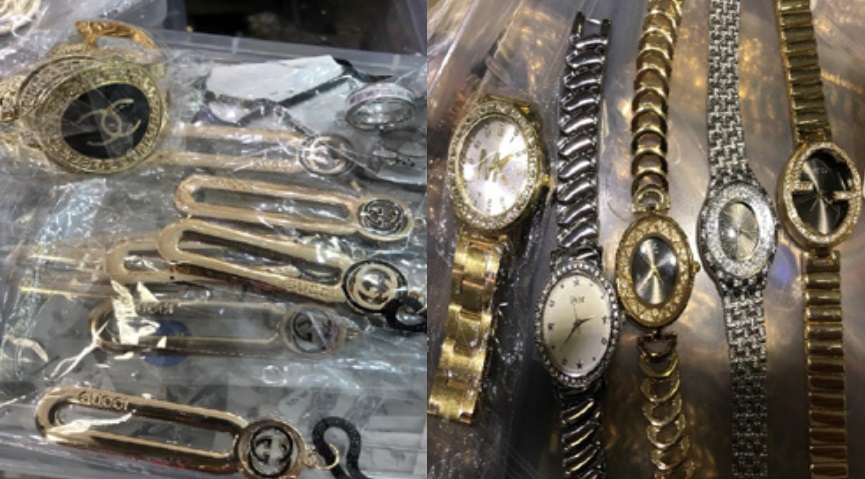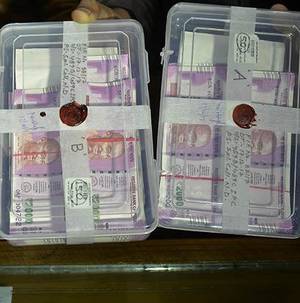
Lorry drivers jailed for smuggling eight million counterfeit cigarettes through Port of Dover
Two lorry drivers have been jailed for four and a half years for trying to smuggle more than eight million counterfeit cigarettes in boxes labelled as nappies through the Port of Dover.
An investigation by HM Revenue and Customs (HMRC) revealed Aleksander Kazakin, 43, and Pawel Gromek, 50, both of Poland, conspired to bring illegal tobacco goods worth £2,314,441 in unpaid duty into the UK.
Kazakin was stopped by Border Force officers as he entered the UK on 14 May 2019. A search of his lorry trailer revealed 8.2 million cigarettes packed in nappy branded boxes. He was arrested and the cigarettes were seized.
Gromek entered the UK later that day with a cargo of nappies. He was not transporting any illegal cigarettes but Border Force officers found he was carrying documents linking him to the seizure. The documents were identical to those used by Kazakin and corresponded to labels on the boxes containing the counterfeit goods. He was arrested and the case was passed to HMRC for further investigation.
Kazakin and Gromek were both convicted of excise fraud at Maidstone Crown Court on 13 November 2019 and were each sentenced to four years and six months in prison.
Lear More14 Indicted in $6 Million Counterfeit iPhones Scheme in US
New York: The FBI has busted and charged 14 alleged members of an international criminal gang in the US with fraud, conspiracy, identity theft and money laundering charges related to their counterfeit iPhone and iPad scheme that reportedly cost Apple over USD 6.1 million.
According to a federal grand jury indictment unsealed on Wednesday in San Diego, California, the gang was led by three brothers and they imported more than 10,000 counterfeit iPhones and iPads from China.
They then exchanged them for the real thing at Apple stores throughout the US and Canada, and then shipped the authentic devices back to China and other foreign countries to sell at a premium, according to the release from the US Attorney’s Office in the Southern District of California.
Genuine Apple (AAPL) iPhones and iPads have International Mobile Equipment Identity (IMEI) and serial numbers that are unique to each device. As part of the scheme, the counterfeit devices were equipped with IMEI and serial numbers that matched those of real devices covered by an Apple warranty in the US or Canada, according to the release.
“The manufacture of counterfeit goods — and their use to defraud US companies — seeks to fundamentally undermine the marketplace and harms innocent people whose identities were stolen in furtherance of these activities,” US Attorney Robert Brewer said.
Lear More
Jewelry Distributor Arrested With $15M in Counterfeit Goods, Police Say
The owner of a business in the downtown Los Angeles jewelry district has been arrested for allegedly selling counterfeit jewelry.
Moossa Lari is accused of felony trademark violation, according to a press release from the LA Police Department.
Investigators conducted several undercover buys and surveillance operations and determined that he was “a major distributor of counterfeit jewelry nationwide,” the release states.
Search warrants were served at multiple locations in the jewelry district on Nov. 7 by LAPD in collaboration with the FBI, Homeland Security Investigations and Custom Border Protection.
Officers seized about $58,000 in cash and over $15 million counterfeit jewelry with Street value of over $1 million, according to the release. Counterfeit jewelry recovered included fake Hermes, Gucci, Chanel, Louis Vuitton, Rolex, Michael Kors, Cartier, Tiffany Co., YSL, Dior, Calvin Klein, Guess, Van Cleef and Bvlgari pieces.
https://instoremag.com/jewelry-distributor-arrested-with-15m-in-counterfeit-goods-police-say/
Lear MoreNike says bye to selling on Amazon
Big brands have quit Amazon’s platform due to sales of counterfeit products and unauthorised sellers which undermines the value of the original brands.
Oregon: Nike has decided to stop selling on Amazon, ending a pilot program that started in 2017. The athletic brand said that it will no longer sell its sneakers and apparel on the e-commerce website, as it prepares to offer a more direct customer experience, Bloomberg notes.
Big brands have quit Amazon’s platform due to sales of counterfeit products and unauthorised sellers which undermines the value of the original brands. However, Nike said it will continue to use Amazon Web Services to power its apps and web services.
Lear MoreSmuggled imported cigarettes worth Rs 1 crore on board train seized in Bengaluru.
BENGALURU: Acting on a tip-off, the Railway Protection Force (RPF) seized imported cigarettes valued at around Rs 1 crore from the parcel van of Karnataka Express at Krantiveera Sangolli Rayanna Railway Station, on Tuesday evening. The consignment was booked on a train from New Delhi. This is the second major seizure of imported cigarettes smuggled into Bengaluru via trains.
Senior Divisional Security Commissioner of RPF, Bengaluru, Debashmita Chattopadhyay Banerjee told The New Indian Express that 7,180 boxes, each containing 50 cigarette packets, were seized from the Vehicle Parcel Unit of Karnataka Express when it reached the platform at 6.30 pm. “They appear to have been imported from the West Asia or Bangladesh. There was no one accompanying the parcel on the train. It has been booked from New Delhi railway station. We are investigating into it,” she said.
The RPF immediately alerted both Customs as well as Sales Tax officials about the seizure. “This is the second such seizure of cigarettes inside trains in the last four months,” Debashmita added. The cigarettes, packed in cartons and covered with white gunny bags, were concealed among other items to escape detection, said Assistant Security Commissioner, Yeshwantpur, Rajagopala Reddy, who was involved in the operations with a 10-member RPF team.
Lear MoreRoundtable on Counterfeit Food products , New Delhi
13/11/2019 | New Delhi
The food and beverage industry faces a challenge from counterfeiters on a global scale. Counterfeit foodproducts and beverages threaten the health and safety of people around the world who often unsuspectingly buy these potentially very dangerous goods. More so, this is coupled with the loss of revenue and reputation of the impacted industry. Counterfeiting in this area is particularly dangerous because consumption of non-standard or low quality edible food and drinks can lead to involuntary ingestion of toxic substances that may cause serious health ailments or be life-threatening.
The magnitude and effects of counterfeiting are of such significance that they compel strong and sustained action from governments, business and consumers. With this in view, Food Safety and Standards Authority of India [FSSAI] and FICCI’s Committee Against Smuggling and Counterfeiting Activities Destroying the Economy [CASCADE] jointly organized a Roundtable on Counterfeit Food Products. This roundtable was organized with the objective to have in place a detailed action plan for government, enforcement agencies and industry to address this menace. The initiative was supported by FICCI CIFTI and E-Commerce Committee.
Mr. Pawan Agarwal, CEO, FSSAI, who chaired the roundtable, stated that FSSAI would look into the problem of counterfeit food products holistically and advised the food safety administration on the legal provisions available and their effective enforcement. Moreover, based on the inputs received from industry, an action plan would be developed to address the issue of counterfeit food products, which will be based on the following parameters:
* Nature, Background & Current Status of Counterfeiting of Food Products in India
* Current Legal & Regulatory Provisions to Check Counterfeiting of Goods
* Industry Initiatives for Controlling Counterfeiting
* Initiatives by E-Commerce Companies
* Initiatives by Direct Selling Companies
* Leveraging Technology: Use of Track & Trace Mechanism to Control Counterfeiting
* Strengthening of Enforcement & Surveillance Mechanism
* Consumer Awareness & Capacity Building
* CASCADE & Industry Associations Initiatives on addressing Counterfeiting
Mr. Anil Rajput, Chairman, FICCI CASCADE said that over past several years through its various initiatives, CASCADE had taken a number of steps to address the threat of counterfeiting and smuggling. A key tool to address this issue is educating consumers to ask for a bill while buying products so that this would act as a proof-of-purchase and can be used for consumer protection in case the product is a counterfeit. He also emphasized that strengthening the penal provisions along with their speedy adjudication for cases related to counterfeiting were imperative.
The roundtable was attended by leading food and beverage companies, including ITC, Nestle, Britannia, Dabur, Coco-Cola, Hindustan Unilever, Mondelez, Mars, Marico, DS Group, Perfetti Van Melle, Pernod Richard, Diageo etc. who flagged their individual issues. Representatives from major e-commerce companies, e.g. Amazon, Flipkart, Shopclues and Snapdeal also participated and explained their compliance mechanisms to address online counterfeiting.
GS1, the leading organization for anti-counterfeiting solutions, also presented their perspective on curbing this menace through the use of authentication solutions. However, it was felt that the counterfeiting scenario of each industry was unique; and therefore, solutions to address needed to be tailored according to the concerned sectors.
The members at the roundtable conclusively agreed that the criminal activities of illicit operators will only continue to be more aggressive, bolder, and more effective at infiltrating the legitimate supply chain. The proposed pragmatic action plan by FSSAI is, therefore, a welcome and much-needed step to create the desired deterrence and strengthen actions against the perpetrators of such crimes.
Lear MoreFake perfumes worth Dh33 millon siezed in biggest ever raid in UAE.
In the biggest-ever haul of counterfeit perfumes, 119,960 bottles of fake perfume worth Dh33 million were seized by the Ras Al Khaimah Department of Economic Development.
The seized perfume bottles had fake trademarks of 18 international brands, said Faisal Abdullah Alyoon, acting director of commercial control and protection section. Up to 25,000 packs of perfumes were of unknown brands, Alyoon said.
“More investigations are to be carried out to identify the owners of the unidentified brands.”
“This is the biggest seizure of fake perfumes in the country and it was found in a farm at Shamal area to the north of the emirate.” Investigations showed that the farm was being illegally used as a warehouse to store fake perfumes, he added.
“We were tipped off about a farm stocking fake perfumes. A search team was formed to collect and verify all information and evidence over one week,” Alyoon said. The farm was raided, in collaboration with the RAK Police, and the bottles of fake perfume were confiscated.
https://www.khaleejtimes.com/uae/ras-al-khaimah/fake-perfumes-worth-dh33-million-seized-in-uae
Lear More
Smuggling fake notes? Been there, done that
When law enforcement agencies arrested Manglu Sheikh and two others in West Bengal’s Malda district on July 20 this year for allegedly smuggling fake Indian currency notes (FICN) worth ₹7 lakh, they were in for a surprise — almost four years ago, before demonetisation, Manglu and his men had been arrested for the same crime.
Manglu, a resident of Kaliachak in Malda, had been arrested in the same district in 2014 for smuggling FICN with a face value of ₹2 lakh. Imprisoned for 22 months, he was freed after completing his term.
Further enquiries revealed that three other members of his family had also been charged for smuggling FICN.
And Manglu’s family is just one among several such cases where more than one member of the family in the Kaliachak region bordering Bangladesh is accused of smuggling FICN.
https://www.thehindu.com/news/national/smuggling-fake-notes-been-there-done-that/article25447385.ece
Lear MoreNIA names two Pakistani nationals in fake currency smuggling
JAIPUR: The National Investigation Agency (NIA) on Friday said it has filed a charge sheet against two Pakistani nationals for smuggling fake currency from Pakistan with the face value of Rs 94,000.
The agency said it has named Ran Singh and Kunjp as the accused in its 350-page charge sheet filed on Thursday in a NIA Special court for criminal conspiracy of production, smuggling and circulation of high quality counterfeit Indian paper currency from Pakistan to India with the intention to damage the monetary stability of India by way of circulating the same in India.
NIA officials said that Singh was arrested by the Customs Department from Thar Express in Rajasthan’s Bikaner while he was travelling from Pakistan to India on March 16, 2019 with 47 fake notes of Rs 2,000 denomination having a face value of Rs 94,000. According to the NIA, Kunjp, who is still absconding, is a resident of Tarkarpur in Pakistan.
The NIA took over the investigation of the case on April 9, 2019 and its probe revealed that the seized high quality counterfeit currency notes were smuggled into India by Singh, who is part of a gang involved in the production, smuggling and circulation of fake currency in India and was temporarily residing in Gujarat’s Morbi district.
Lear More
In 3 months, gold worth Rs 55.80 crore smuggled into Karnataka.
BENGALURU: Reaffirming the fact that airports in Bengaluru and Mangaluru have become major hubs for gold smuggling, the Directorate of Revenue Intelligence (DRI) has unearthed a new ring of syndicates, working in cohorts with Customs officials. In a crackdown, DRI Bengaluru zonal unit, has uncovered how the smuggling syndicate in Dubai and South India allegedly “recruited” some “pliable” Customs officers to give safe passage to their couriers who bring in the precious yellow metal, in exchange of monetary gratification.
Between July and September 2018, two Customs officers, Havaldars Shrikantha Poojary and Ashwin N V, who were then deployed at Mangaluru International Airport (MIA), had allegedly connived with the kingpin Ahmed Shamsher alias Chechu of Kasargod in Kerala, and his counterparts in Dubai. They had smuggled in 186 kg of gold worth Rs 55.80 crore, using 123 passengers, a majority of whom were also from Kasargod, an official source told TNIE.
“Chechu, who had then fled the country, was detained under the stringent Conservation of Foreign Exchange & Prevention of Smuggling Activities Act (COFEPOSA) recently at Surathkal railway station, and is lodged in judicial custody at Bengaluru Central Prison,” he added.
Lear More



